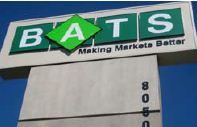
(Bloomberg) — Goldman Sachs Group Inc. and Citadel LLC plan to take seats on the board of Bats Global Markets Inc. after the exchange operator completes its merger with Direct Edge Holdings LLC.
Bats and Direct Edge agreed to merge this week, creating the second-largest U.S. stock exchange owner by market share. Goldman Sachs and Citadel both have representatives on the Direct Edge board, and bringing them into the ownership structure of the new entity was an important part of the deal, Bats Chief Executive Officer Joseph Ratterman said today on Bloomberg Television’s “Market Makers” with Erik Schatzker.

“It was important to us to have the shareholders behind Direct Edge behind the combined effort,” he said. “In the past there wasn’t as much discussion about how they would join around the table and this time that was how they wanted to go.”
Conventional exchange operators NYSE Euronext and Nasdaq OMX Group Inc. became for-profit, publicly traded entities with broad investor bases in the past decade, shedding a mutualized structure in which broker-dealer members were its owners. Bats and Direct Edge, which together handle about 20 percent of U.S. equity trading, have essentially resurrected that model.
Goldman Sachs, the fifth-biggest U.S. bank by assets, and hedge-fund owner Citadel hold 19.9 percent stakes in Direct Edge. So does KCG Holdings Inc., the trading firm formed this year by the merger of Knight Capital Group Inc. and Getco LLC. International Securities Exchange LLC, the options market owned by Deutsche Boerse AG, has the biggest stake at 31.5 percent.
Private Equity
Shareholders of Bats include KCG, Morgan Stanley, Credit Suisse Group AG, Nomura Holdings Inc. and Citigroup Inc. This month, two private-equity firms, Spectrum Equity Investors LP and TA Associates Management LP, revealed that they purchased stakes in Bats from the estate of Lehman Brothers Holdings Inc.
Bats and Direct Edge are “re-creating the mutualized exchange,” Direct Edge CEO William O’Brien told Traders Magazine in an interview published today. “The relationship between exchanges and its members has broken down in recent years.” Given that owners of Bats and Direct Edge are also its clients, “it will help us stay focused on the customer.”
Bats, based in Lenexa, Kansas, was founded in 2005. Direct Edge, which started as Attain ECN in 1998, was purchased by Knight Capital in 2005 and spun off in 2007.
The concentration of broker-dealer ownership at Bats and Direct Edge comes amid pressure to strip exchanges of their status as self-regulatory organizations, a model in which they write and enforce rules of conduct for their members. The government should remove that designation from U.S. exchange owners, the Securities Industry and Financial Markets Association said on Aug. 1.
Inherent Conflict
Exchanges’ status as SROs means “one group of businesses is empowered to oversee and regulate the business and activities of its competitors,” Theodore R. Lazo, associate general counsel at the trade group, wrote in the letter to the Securities and Exchange Commission. “Conflicts of interest in this model abound and only worsen as they are left unresolved.”
Ratterman said today that, following the Bats-Direct Edge merger, the company may once again consider opening a corporate listings business. Bats was poised to do so last year by listing its own stock, but a technical malfunction scuppered that plan. Currently, Bats lists some exchange-traded funds.
Getting a listings business will have to wait for the deal to close, which Ratterman expects in the first half of 2014, and then for Bats to replace Direct Edge’s trading technology with its own. That may take six to 12 months, Ratterman said.
The Bats CEO doesn’t anticipate U.S. stock trading volume will surge. The number of shares changing hands daily in the U.S. has fallen by one-third since 2009 to 6.2 billion this year, according to data compiled by Bloomberg.
“I think it is the new normal,” Ratterman said of this year’s volume. “There was a lot of impetus between 2007 and 2009 that had markets rising and I think those have played themselves out. Today, where people are choosing to place their risks and their bets is in a number of asset classes.”
Ratterman said that Bats is basing its business plans on the assumption that volumes stay at recent levels.
“As far as we’re concerned, we’re forecasting where we’re at going forward, and if there’s a rise over time, that’ll be nice, but we’re not counting on it.”